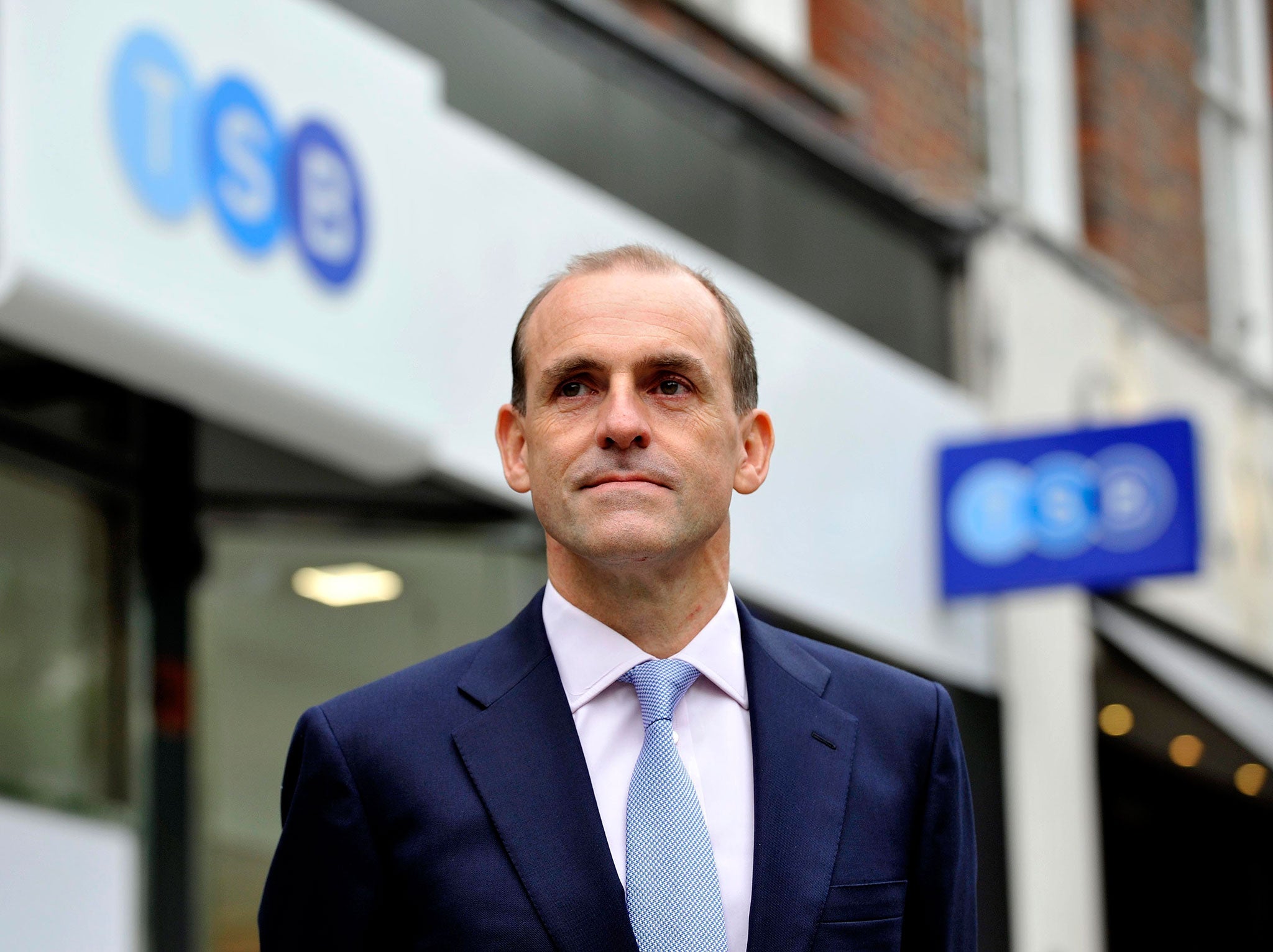It's a good thing TSB's chief executive hasn't given up his £2m bonus – here's why
We have become used to seeing top managers brazenly reap absurd rewards for mediocrity or even failure

Your support helps us to tell the story
From reproductive rights to climate change to Big Tech, The Independent is on the ground when the story is developing. Whether it's investigating the financials of Elon Musk's pro-Trump PAC or producing our latest documentary, 'The A Word', which shines a light on the American women fighting for reproductive rights, we know how important it is to parse out the facts from the messaging.
At such a critical moment in US history, we need reporters on the ground. Your donation allows us to keep sending journalists to speak to both sides of the story.
The Independent is trusted by Americans across the entire political spectrum. And unlike many other quality news outlets, we choose not to lock Americans out of our reporting and analysis with paywalls. We believe quality journalism should be available to everyone, paid for by those who can afford it.
Your support makes all the difference.TSB’s under-fire boss, Paul Pester, faces losing his £2m bonus – and potentially his job – over the IT fiasco that has engulfed the bank this week.
Many of the financial institution’s five million customers will no doubt rejoice if the bonus is cancelled. I will join them, not out of solidarity or even schadenfreude but because it might restore a small amount of faith in UK boardrooms that’s been lost thanks to excessive and undeserved payouts.
When questioned by the BBC, Mr Pester refused to commit to voluntarily giving up the payout. It was, he said, a “decision for the remuneration committee”.
It sounded like a classic bit of corporate chicanery around a question that he must have known was coming. Perhaps he’d been having media training during the 48 hours in which he went awol before he “resurfaced” on Tuesday to tell TSB customers what they already knew: that they still couldn’t access their bank accounts.
A cynic would say the TSB man’s comments showed he was just hoping this mess would blow over, safe in the knowledge his friends on the committee – which is made up of fellow TSB board members – would recommend handing over his £2m once the media furore had dissipated.
But I’m glad he didn’t volunteer to give it up when he was put on the spot by a journalist, because it gives the UK corporate governance system a chance to show that it’s not totally broken.
As executive pay has ballooned to absurd levels we have become used to seeing top managers brazenly reap absurd rewards for mediocrity or even failure.

So the remuneration committees who are supposed to rein in excesses, and keep rewards in line with performance, have a lot to answer for.
Witness Jeff Fairburn, the boss of housebuilder Persimmon, who walked away this week with £75m for services to alleviating the housing crisis. To give him his due, he was in line to collect £100m before he offered to reduce his pay, but only after considerable public outcry.
Persimmon’s finance boss Mike Killoran received £53m, and managing director Dave Jenkinson scooped £38m.
The chairman of the board who signed off that completely uncapped pay deal admitted he’d made a big mistake and resigned.

But Pester’s situation is very different from Fairburn’s. TSB’s accounts suggest that, in this case, the remuneration committee has actually been doing its job.
The chief executive’s pay dropped from a not inconsiderable £3.7m to £1.8m last year because his bonus was withheld.
Why? Because TSB’s pay panel decided to hold back £400,000 from 2015 and £1.6m from 2017 until “migration and integration” with TSB’s Spanish parent company was successfully completed.
That migration has been an unmitigated disaster with around half of customers still unable to access their accounts five days after it was supposed to have finished.
Unfortunately for Pester, much of his pay appears to be tied to delivering the crucial IT project that has gone so spectacularly awry. That’s exactly how discretionary pay is supposed to work.
The case for Pester’s defence when the remuneration committee comes to meet again does not look good.
Apart from massive reputational damage, the debacle has also cost the bank a lot of money. TSB handed customers a higher interest rate that could set the bank back £30m. It’s also waived overdraft fees for April, which won’t come cheap, and the project had already been subject to delays costing tens of millions more.
TSB wouldn’t say when the four remuneration committee members will meet, but when they do they must surely do the right thing and scrap the bonus so that one very small positive can be taken from this sorry situation.
Five million customers will be watching them, if they haven’t already left by then.
Join our commenting forum
Join thought-provoking conversations, follow other Independent readers and see their replies
Comments